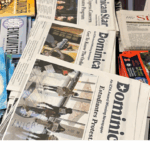While the national press debates President Trump’s DEI initiatives at colleges and universities across the country, college newspapers find themselves at the forefront during a tumultuous time.
The Student Press Law Center issued a special media alert April 4 for student media covering these events.
“At this moment, it is essential to hear from those most impacted by current U.S. policies,” the alert stated. “It is our duty as journalists to seek them out. Find the balance required to tell the most accurate story you can while minimizing harm.”
Red, blue and swing states are dealing with Trump’s orders. The University of Michigan announced that it was eliminating DEI in late March. The Michigan Daily, Michigan’s student newspaper, captured community reactions with its story on the elimination of two DEI offices.
The story reported on multiple points of view and also captured the feel of campus. Another story made an argument against using antisemitism as an excuse to punish universities for protests made by students last spring.
Just over an hour’s drive away, Michigan State’s college newspaper covered how the University is not eliminating their DEI programs. The story questioned if Michigan State would continue to support international students as more disturbing incidents take place.
The job student newspapers are doing makes a difference — especially on campus.
In Missouri, a red state where most universities have eliminated DEI offices and programs, students are covering the fallout.
“It’s been a big issue,” said Jack Dimond, a Missouri State senior instructor and faculty advisor of the school’s student paper, The Standard. “There have been demonstrations and I think they’ve covered it fairly well.”
The Standard continues coverage of DEI fallout and Dimond is satisfied that his students are telling a well-balanced story.
“As best as I can tell, I haven’t seen anything cringeworthy. The fact that they’re choosing to cover [the protests] could be seen as they’re favoring the side that’s protesting,” he said.
“We haven’t had any students worry,” Dimond said. “They’ve shown a willingness to get in there and do it. They’ve pursued it from a standpoint that it’s news and they need to go do it.”
But with the March 25 detention of Tufts University student Rumeysa Ozturk, a doctoral candidate, by ICE could scare and silence journalists, foreign students as the arrest came around when she co-authored an op-ed about Palestine.
The Student Press Law Center and 13 other free speech and press organizations condemned the arrest. “Such a basis for her detention would represent a blatant disregard for the principles of free speech and free press within the First Amendment, and we call on Tufts University officials, Massachusetts lawmakers and federal authorities to take immediate action to secure her release,” the letter states.
Eric Lutz, faculty advisor to The Elmhurst Leader in suburban Chicago, said the case is jarring.
“I think you have to be concerned,” he said. “Whether you have an immigrant student writing or not, the tendency to self censor is there. But I think my students are motivated to get the story.”
At Purdue University, The Purdue Exponent announced their move to redact names and images of pro-Palestinian students from every story published to their website since Oct. 7, 2023.
At Muhlenberg College in Pennsylvania, the Weekly reported that a student was picked up and detained and then later released. At Southern Illinois University Carbondale, the Daily Egyptian reported in late March that an international student had their visa revoked.
It’s not just the deportation of immigrant students. It’s an overall attack on free speech.
“It’s a general menacing environment right now,” Lutz said. “All sorts of soft power can be used to put pressure on universities to [end DEI initiatives] and on students to self censor.”
In Illinois, most universities are continuing their programs — for now.
At Elmhurst, the Leader took its president to task for not defending DEI enough, with the faculty following suit.
“A lot of times you have students who want to express themselves through op eds,” Lutz said. “This group wants to do hard news coverage. It’s easier for someone to ignore opinion. But when you do well-sourced reporting, it’s hard to ignore. It holds people’s feet to the fire.”
College newspapers are not avoiding this difficult story. They’re putting in the work and getting stories out. Many of those stories document the students impacted by Trump’s initiatives. Many of the stories are uncomfortable.
- Erasing history: Federal judge likens Trump’s order to remove slavery exhibit near Liberty Bell to Orwell’s 1984
- ‘Sorry, AP Chem’: How student media at one Missouri high school covered a walkout to protest ICE
- News analysis: Missourians take leading roles in Trump’s ‘weaponization’ of the Justice Department and election denial
- Commentary: Stars and Stripes’ legacy of editorial independence shows value of a free press
- News analysis: Trump’s handling of Minnesota investigations defies time-tested procedures and looks like a ‘cover-up in plain sight’
